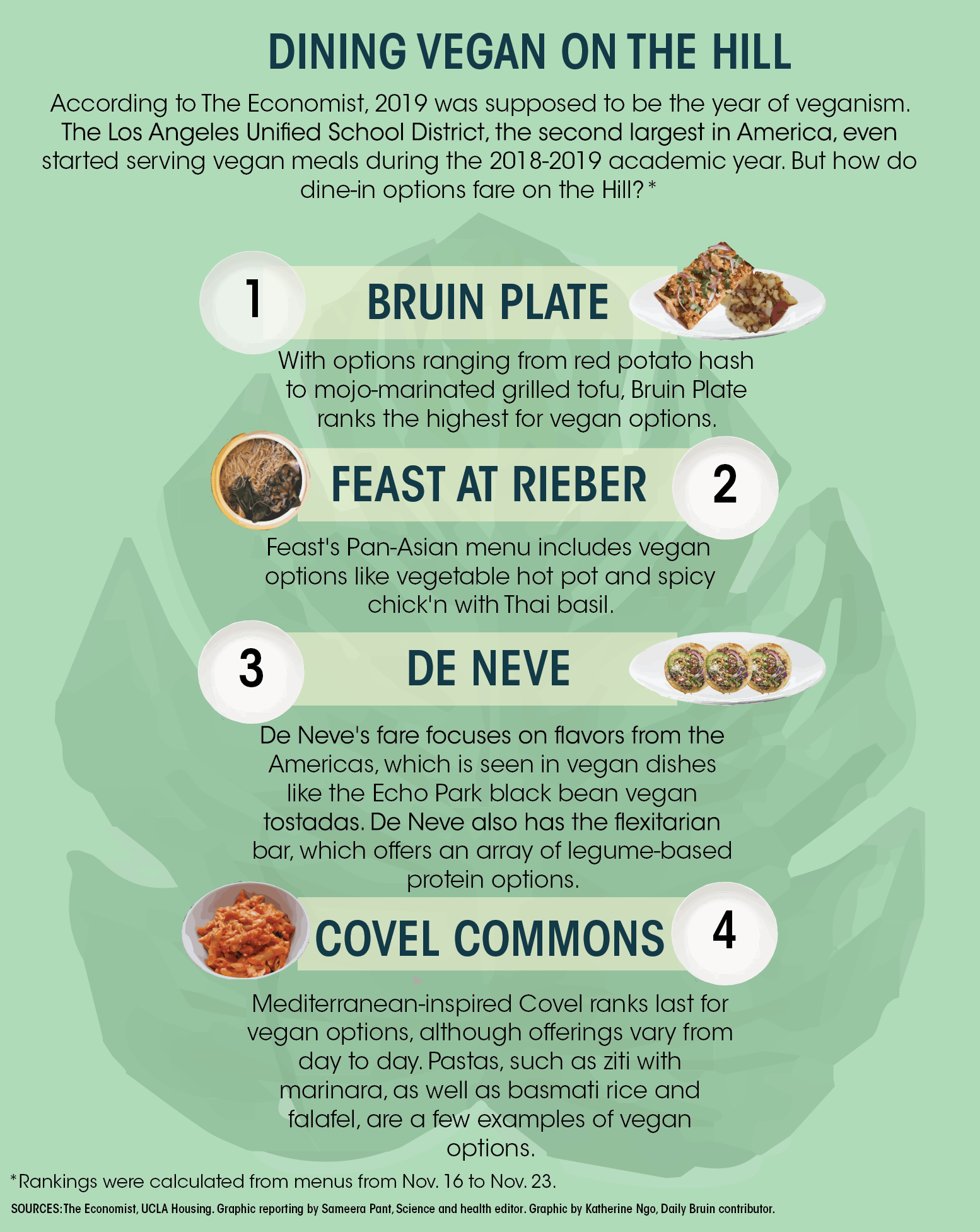Campus Queries: What benefits to people and the environment sprout from veganism?

By Priscilla Guerrero
Nov. 21, 2019 12:37 a.m.
This post was updated Nov. 26 at 4:45 p.m.
Campus Queries is a series in which Daily Bruin readers and staff present science-related questions for UCLA professors and experts to answer.
Q: How does veganism affect us and the environment we live in?
A: Eating more plant-based foods is not only healthy but may have a significant impact on the environment, UCLA experts said.
One of the most compelling aspects of a vegan diet is its impact on our health, said Carole Bartolotto, a registered dietitian for UCLA Dining Services, in an emailed statement.
It is an unfounded concern that vegan diets are deficient in protein, she said. Adequate protein can be gained from a varied diet of vegan products such as beans, lentils and nuts, Bartolotto added.
“Foods high in plant protein come with other beneficial ingredients such as fiber and health-enhancing phytochemicals, whereas animal protein often comes with unhealthy substances such as saturated fat,” Bartolotto said.
Additionally, many people who move towards a healthy whole-foods, plant-based diet are able to take fewer or no medications for their chronic health conditions and some have reversed the effects of heart disease, Bartolotto said. A vegan diet can also help with weight loss and lower the risk of heart disease, diabetes, stroke, cancer and high blood pressure, she added.
However, since a vegan diet eliminates all animal products, nutrients that are only found in animal products, such as vitamin B12, are recommended to be taken as supplements, Bartolotto said.
Dana Hunnes, an adjunct UCLA assistant professor in the department of community health sciences, said consuming plant-based foods helps individuals lower their carbon footprint.
A carbon footprint, in regard to the foods humans eat, refers to how much carbon is emitted from the product into the atmosphere or how much carbon it takes to get the product from farm to table, Hunnes said.
A cow’s carbon footprint is quite high since they produce methane, a greenhouse gas that has a high carbon content and is about 23 times as potent as carbon dioxide. Conversely, corn pulls carbon dioxide out of the atmosphere, making its carbon footprint low, Hunnes added.
“There are reports that the foods we eat contribute anywhere between a quarter to about 50% of all the greenhouse gases globally,” Hunnes said. “What we eat actually represents a large proportion of all the carbon going into the atmosphere, not just the amount of miles we drive or the amount of energy we use.”
The world’s population is projected to grow by a third within the next five decades, Hunnes said. This will lead to a greater consumption of meat. As a result, diet will have a large impact on the environment over the next 50 years, especially as we adopt more environmentally friendly methods of transportation and electricity, she added.
Hunnes said she believes one of the biggest impacts an individual has on the environment comes from what they eat. Eating a cheeseburger is the same as driving a car for 15 miles or taking three months’ worth of showers in terms of carbon footprint, she said.
“If you think about every time you sit down for a meal, you make an active choice of what to eat,” Hunnes said. “It’s sort of like saying, ‘I can drive my car for 15 miles, or I can eat something that’s going to be better for the environment.’ That’s why what we eat is the most significant impact we can have, and it’s also better for our health.”
Jacob Eastlick, a third-year sociology student, switched to a vegan diet in the middle of his first year at UCLA.
“I was kind of not eating the best and I wasn’t feeling like myself,” Eastlick said. “And so I was like, ‘Okay, I’m going to try being vegan for a month. If I don’t like it, I’m just going to stop,’ and I ended up loving it.”
Eastlick said he felt more energetic than he had before, and has been a vegan ever since.
UCLA Dining Services is aiming to reduce menu items with animal proteins by 10% during the 2019-2020 fiscal year, Bartolotto said. Currently, Dining Services is working with public health graduate student Hannah Malan on the Impossible Foodprint Project at Rendezvous West, in which students can have Impossible plant-based meat as an alternative to animal protein.
“This project was implemented at the beginning of fall quarter 2019 as part of our commitment to reducing menu items that use animal products,” Bartolotto said.
Eastlick said he appreciates the introduction of Impossible meat and UCLA’s initiative to reduce the environmental impacts of its food options.
“I think it’s important for people to see … just how much meat can really impact our carbon footprint,” Eastlick said. “So I think it’s awesome that Rendezvous is doing (this) and I hope they continue to do it.”


